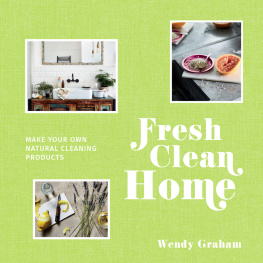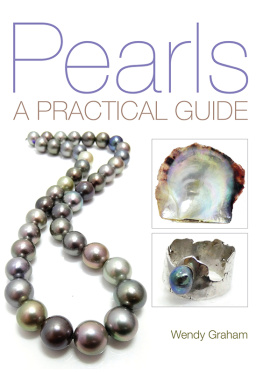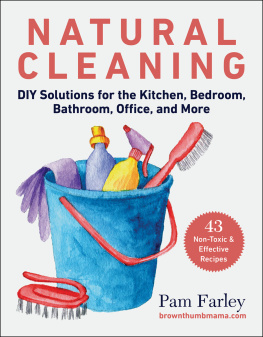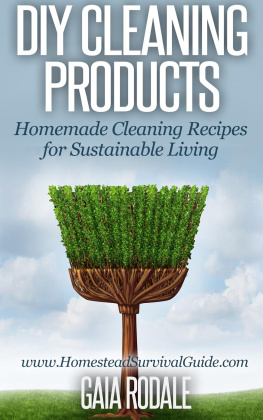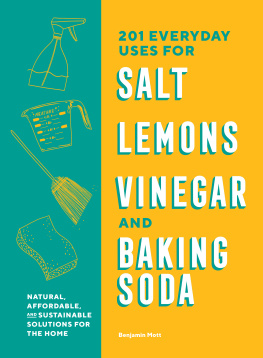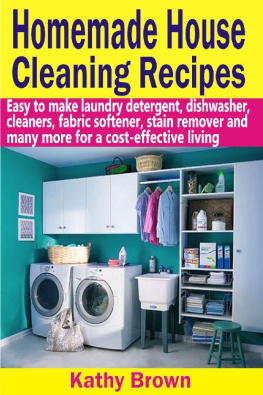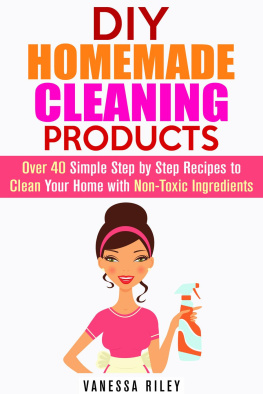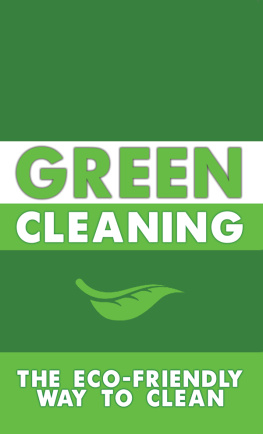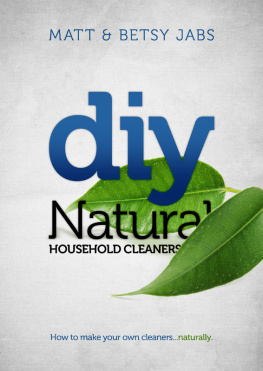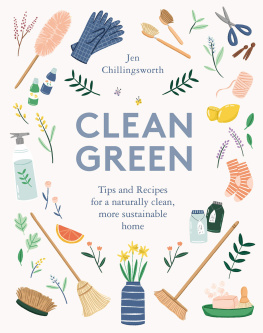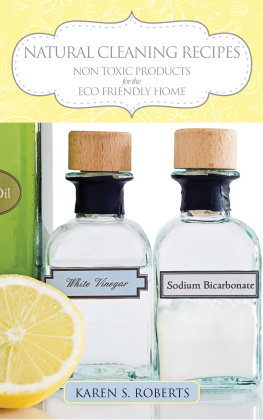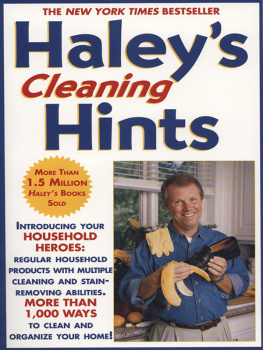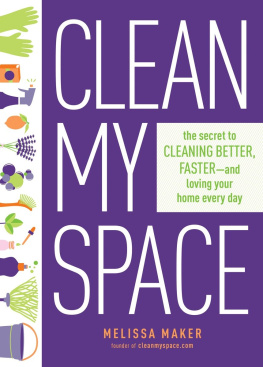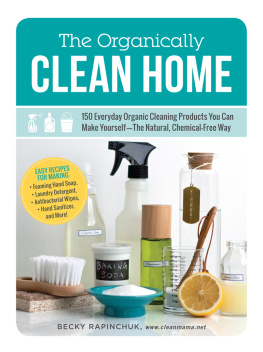Recipe Menu
Guide

Recipe Menu



Introduction
From reducing the number of harsh chemicals you use in your home to saving money, or living a little lighter on the Earth (and everything in between), there are myriad reasons to want to try making your own natural cleaning products.
I have been making my own cleaning products for more than a decade, and have amassed a host of natural and effective recipes to clean every corner of my home.
So how did it all begin? Over ten years ago, I had some laundry that kept coming out of the washing machine with a funny smell. It was exasperating! I couldnt figure out the problem, until after some rather extensive research I discovered that the fabric conditioner Id been buying merrily for years was to blame. It had gummed up our washing machine, making it a breeding ground for bacteria. Not only that: I also discovered that the way that conventional fabric conditioner works is to cover your clothes with a waxy coating that softens the fabric, but it makes the fabric less able to absorb water and detergent, which locks in bad odours. Needless to say the first recipe I ever made was natural fabric conditioner, after giving my machine a thorough clean.
Although I was exceptionally dubious to begin with, I was surprised to find that the natural methods I experimented with solved our machine issue completely. It was a lightbulb moment for me: I now knew that natural methods could work more effectively than conventional products, and be so much cheaper. That was it. I was on a mission, slowly but surely, to replace the cleaning products I use in my home with the homemade versions Im about to share with you.
If youve tried making natural cleaning products before and have been disappointed with the results, I want to encourage you to try again there could be good reasons why your first attempts didnt work. After all, this is delicate chemistry. And if you think natural cleaning is all about vinegar, think again. While I think vinegar definitely has a place in natural cleaning, I dont think its the most effective cleaner for every situation youll find that many of my recipes are vinegar-free.
How to Begin
Start slowly. Use up the products you already have and as they run out try making their natural replacements (dont throw away any pump sprays or bottles give them a thorough clean-out and save them to fill with your own homemade products). Also, remember that this isnt a case of all or nothing if you find there are certain shop-bought products you cant do without, thats okay. Even I have a few staples that to this day find their way into my shopping trolley. I hold my hands up, and confess:
Washing-up liquid
Ive found that an effective homemade washing-up liquid is too tricky it requires specialist ingredients (such as anionic surfactants that lather and clean) and I find its much easier and more cost effective to buy a bottle of eco-friendlier product. I not only wash up with it, but youll see that I use it in several of my homemade recipes for other products, too.
Dishwasher tablets
Pretty much all commercial dishwasher tablets contain an ingredient called sodium silicate, which rinses away food and soap deposits, and is completely soluble in water. As a result your dishes always come out clean and streak-free. Ive found that any homemade formula that doesnt contain sodium silicate just does not work but sodium silicate is available only commercially. I concede: eco-friendlier shop-bought dishwasher tablets it is.
In short, dont get too bogged down in trying to replace everything. The more you make, the better for you, your home and the environment, but if thats only one or two products overall, thats still enough to make a positive difference. With that in mind lets get started with some of the basics behind natural cleaning from what youll need to a few notes on safety and effectiveness.
The Must-haves
I like to keep things as simple and as straightforward as possible, so I use a core group of easily sourced ingredients to make my cleaning products. Some of these you may already have in your cleaning armoury, or even lurking in your food cupboards.
Bicarbonate of soda
Not to be confused with baking powder, bicarbonate of soda (also known as baking soda) is a natural cleaning staple (it just happens to be used in baking, too). Rather than buying the little tubs from the supermarket, look for 500g/17oz boxes that are often sold in hardware shops and discount stores. Alternatively, you can buy in bulk online. Its the same stuff you would use in baking, but doesnt come in food-safe packaging, so is a lot cheaper.
Glycerine
A natural thickener made from plant oils and often used in baking, glycerine is brilliant when youre making something that needs a thicker consistency, such as the . It also helps to emulsify essential oils with water. You can buy glycerine quite cheaply from the baking aisle in any supermarket. I use Dr Oetker as its vegetarian friendly.
Borax substitute
Also known as sodium sesquicarbonate, borax substitute is chemically very similar to borax (sodium borate, from the mineral boron), which was banned in the UK and EU in 2010 as a result of safety scares. The substitute, which is believed to carry none of the harmful effects of boron, comes from mineral deposits that have brilliant laundry cleaning and general cleaning properties, especially in the bathroom. Its available in hardware and discount stores, and costs little more than loose change for a 500g/17oz box. If you buy online, youll bring the cost down even further.
Hydrogen peroxide
Did you think only bleach could disinfect? Let me open your eyes to the wonders of hydrogen peroxide.
The chemical symbol of hydrogen peroxide is H2O2 basically, thats water with one extra oxygen atom. Put like that hydrogen peroxide might seem innocuous, but in fact its bad news for germs and bacteria. That extra oxygen atom is highly volatile and causes oxidation, a reaction in which the hydrogen peroxide steals electrons from bacteria, breaking down their cell walls. With no cell walls, bacteria, which are simple micro-organisms, die, leaving surfaces germ free.
In addition, it doesnt leave any harsh chemical residue on your natural surfaces, because when hydrogen peroxide reacts with organic material it breaks down into oxygen and water. All this makes hydrogen peroxide an extremely effective disinfectant without the cloying odour or eye- and lung-irritating properties of bleach.
Hydrogen peroxide is commonly used as a mild skin antiseptic and mouthwash, but its sale is a little restricted, so its sold only over-the-counter by pharmacists. You can buy it in different concentrations I buy the 3% stuff.


